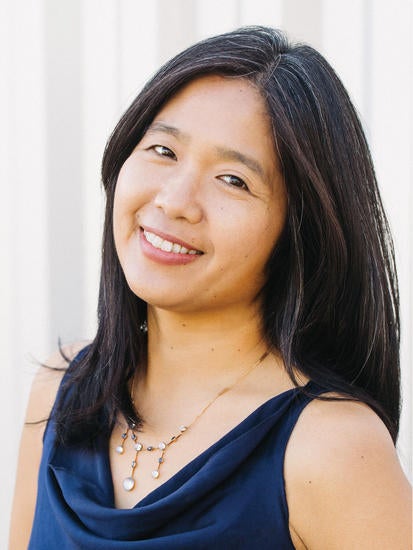ALUMNI PROFILE
THE WRITER
Vanessa Hua’s innate curiosity and love for stories has spelled a successful career in both journalism and literature
By Jessica Weber
ournalist and author Vanessa Hua has always known she was going to be a writer. An American-born daughter of Chinese immigrants, Hua grew up in a Bay Area suburb east of San Francisco. Her father, a structural engineer, and her mother, a scientist, would often drop Hua off at the library, retrieving her later with stacks of books in her arms. A voracious reader as a child, Hua said she identified most with strong female characters like Jo March from “Little Women,” Anne from “Anne of Green Gables,” and Laura from the “Little House on the Prairie” series.
“Even though we didn’t share the same historical era or background, these were all spirited young girls and women who then went on to become writers,” she said. “From early on, I was always interested in figuring out how the world outside was different than the one inside our home. Much of that was through observation, but also through books.”

Hua’s love of writing blossomed in school. She recalls entering and winning writing contests sponsored by a local bookstore and library, and being encouraged by teachers who celebrated her talent, noting a “genius writer” award she was given by her fourth-grade teacher that was particularly meaningful. She went on to Stanford University, earning a bachelor’s degree in English and master’s in media studies. During college, she pivoted her attention to journalism, drawn by an innate interest in people’s stories.
“It sounds almost silly to say, but I remember watching ‘All the President’s Men’ in middle school and being inspired by their ability to shine a light and expose wrongdoing,” Hua said.
After college, Hua worked as a journalist for various publications, including the Los Angeles Times and The Hartford Courant, before returning home to the Bay Area and writing for the San Francisco Chronicle, where she remained on staff until 2007. Her prolific journalism career has seen her reporting on a variety of topics around the world, including in China, Korea, Ecuador, Panama, and Myanmar.
And much like the characters who inspired her in “All the President’s Men,” Hua’s journalism has exposed corruption in her own community, including highlighting poor working conditions and unfair payment at a popular dim sum restaurant in San Francisco. Her reporting even led to the resignation of the California Secretary of State when she and another reporter discovered money for a planned community center was instead used toward campaign donations.
“It was astonishing — there was an FBI investigation,” Hua said. “In the court transcript, they cited our reporting. It was a really powerful example of the impact of exposing wrongdoing.”
Now a weekly columnist at the San Francisco Chronicle, Hua’s work as a journalist has earned her recognition from the Asian American Journalist Association and the Society of Professional Journalists, as well as a James Madison Freedom of Information Award. But despite her success, a desire to return to her first love of fiction writing compelled Hua to enroll in UCR’s creative writing MFA program, which she graduated from in 2009.
Hua has since published three works of fiction. She describes her first book, a 2016 short story collection titled “Deceit and Other Possibilities,” as stories about “model minorities behaving badly.” Her novel “A River of Stars,” which she likens to “a pregnant Chinese Thelma and Louise,” was published in 2018 and garnered a Rona Jaffe Foundation Writers’ Award. Her latest novel “Forbidden City,” which Hua began as a UCR student and became her thesis, was published in May. Set in 1960s China, the story follows a teenage girl who becomes the protégée and lover of communist revolutionary Mao Zedong. It has been named one of the “most anticipated books of 2022” by outlets including Vulture and Book Riot. Publishers Weekly, in a starred review, called it “magnificent.”
A first-generation Asian American, Hua said she takes inspiration from other Asian American authors including Amy Tan and Maxine Hong Kingston. While she hopes her work adds to the coterie, Hua said she strives to represent characters from all ranges of ethnicities, ages, genders, and orientations.
“No community is a monolith,” Hua said. “There isn’t just one narrative of, say, the model minority or the various stereotypes that get portrayed. My focus is on developing a fully fleshed character in all their flaws and strengths, and at the end, hopefully it adds to that narrative plenitude.”
Hua credits her time at UCR with helping her find a community of writers and mentors, noting she uses many lessons from UCR while teaching at the MFA program at Warren Wilson College. She also credits Susan Straight, a distinguished professor of creative writing at UCR and Hua’s mentor, with instilling in her the value of sharing opportunities with fellow writers and being what she calls a good “literary citizen.”
“Writing is entirely solitary; you’re not going to finish your manuscript unless you sit in the chair and finish it,” Hua said. “But being a part of a literary community — attending events, organizing readings, supporting your fellow writers — these are the people who are going to help you in the hard times and have your back, but they’re also going to be rolling deep when you celebrate because you’ve been there for each other.”
Return to UCR Magazine: Spring 2022